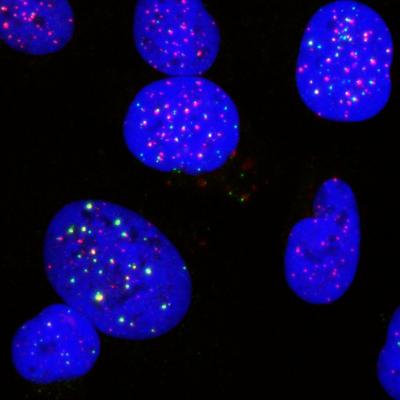
Credit: (IRB Barcelona)
Tousled-like kinases (TLKs) are a potential therapeutic target for cancer treatment due to their central role in DNA repair and replication. The latest work by IRB Barcelona’s Genomic Instability and Cancer Laboratory, led by Travis H. Stracker, concludes that TLK inhibition activates the innate immune system, a very important factor in the response to cancer.
“We believe the TLKs are promising targets for cancer therapy and want to understand more about how they work and how cells respond to their reduction or loss,” says Stracker. Having headed the Genomic Instability and Cancer Laboratory at IRB Barcelona since 2009, in July this year Stracker took up a new position as group leader at the National Cancer Institute (NIH) in Bethesda, in the US.
Alternative lengthening of telomeres
The group of researchers had previously observed that reduced TLK activity made cancer cells more sensitive to some therapeutic agents. Now, they have found that blocking TLKs triggers an alternative telomere lengthening system (ALT), a pathway used by many cancers, including some of the most aggressive ones like glioblastoma, to maintain telomeres and allow cells to continue dividing.
The group of researchers has discovered that activation of the ALT pathway triggers the innate immune system, potentially attracting immune cells, such as macrophages and T lymphocytes. “The activation of innate immunity in cancer has recently become an active area of research as it has become clear that the innate immune response influences chemotherapy and immunotherapy,” comments Stracker.
Genome decondensation and accessibility
In DNA, not all regions have the same function. Some regions contain genes with the information necessary to make proteins, but there are other regions, called heterochromatin, that have a regulatory and structural function, but do not contain genes that give rise to proteins. Another effect of TLK inhibition, observed in this study, is that this heterochromatin, which is usually compacted, ceases to be so, thereby becoming more accessible to the RNA production machinery and leading to an altered composition in the cell.
“This could help us understand our previous observation that TLK depletion caused replication stress and help us exploit the effects of TLK depletion for cancer therapy,” says Sandra Segura-Bayona, first author of the study. Segura Bayona is currently a postdoctoral fellow in the laboratory headed by Simon Boulton at The Francis Crick Institute in London.
###
The project was a collaboration with Camille Stephan-Otto Attolini, head of the IRB Barcelona Bioinformatics Core Facility; Lars Koenig, at the University of Munich, and Simon Boulton, at The Francis Crick Institute. Sandra Segura-Bayona was a PhD student funded by a “La Caixa” International PhD fellowship. Marina Villamor-Paya is funded by an FPI fellowship (by the Spanish Ministry of Science, Innovation and Universities) and the project supported by a grant from the Spanish Ministry of Science, Innovation and Universities.
Media Contact
Nahia Barberia
[email protected]
Original Source
https:/
Related Journal Article
http://dx.




